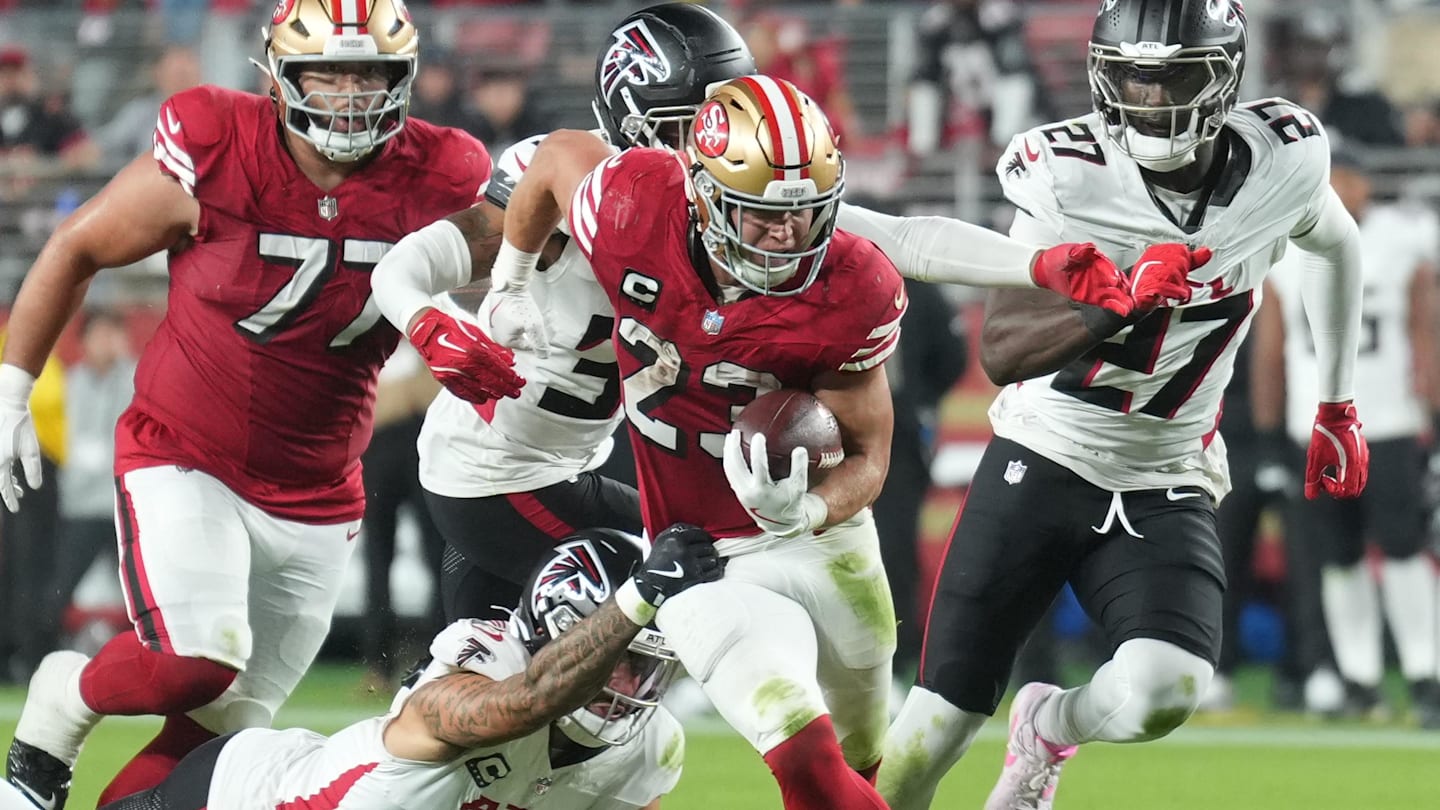After heading into Sunday night’s game with two straight wins over respected opponents, the Atlanta Falcons took a step back in their 20–10 loss to the San Francisco 49ers.
Although Atlanta’s defense held up through most of the game, the Falcons offense couldn’t generate consistent production, converting just 45% of their third downs while holding the ball for nearly five minutes less than the 49ers.
Despite entering the game with the averaging the second-most yards per game, the Falcons were No. 27 in points scored. They fell to 28th after their 10-point outing vs. the 49ers.
Their defensive success looks even more impressive considering how often they’re asked to bail out a struggling offense.
The Falcons Podcast: Spotify | Apple Pods | WATCH
Atlanta’s receivers continue to have trouble separating from man coverage. After Drake London’s dominant outing last week against softer zone looks, San Francisco challenged the Falcons’ wideouts one-on-one while regularly sending pressure, and it paid off.
On a critical fourth quarter 4th-and-1, the 49ers sent pressure and left Chase Lucas in man coverage on London, following him across the field on his motion before breaking up a quick out route. While the Falcons’ receiver corps isn’t known for elite route-running, the issue also could point to a lack of schematic creativity. Atlanta’s current offensive playcalling doesn’t seem to suit the team’s strengths.
With under three minutes remaining and Atlanta trailing, the Falcons ran the same pre-snap sequence multiple times, lining up four wide and motioning David Sills V into a bunch formation. The lack of variation made their late-game offense predictable. For a roster full of young offensive talent, the playcalling continues to hold them back.
The defensive gameplan against the Falcons, while not easy, is relatively simple: Stop Bijan, Stop the Atlanta Falcons.
Linebacker Divine Deablo exited early in the second quarter, and his absence quickly began to hurt the Falcons. After a slow start, the 49ers began leaning heavily on their run game..
Coming into the night, the Falcons defense had allowed the fewest total yards and second-fewest points in the league. But without one of their best run-stoppers, that changed quickly. San Francisco ran the ball 34 times compared to Atlanta’s 20, with Christian McCaffrey tallying 23 carries for 129 yards and two touchdowns while Brian Robinson Jr. complemented him with eight carries for 32 yards.
Clock management has become an ongoing issue for this team.
Last week, Drake London nearly extended the Falcons’ lead to 28–7 before halftime against Buffalo, but stepped out at the one-yard line, letting the clock expire with no points.
This week, a similar mistake struck again. As the pass rush closed in and no receivers were open, Michael Penix Jr. threw the ball away with under ten seconds left, drawing an intentional grounding penalty. Atlanta was out of timeouts, so the ensuing 10-second runoff led to the Falcons ending the half scoreless once again.
Kyle Pitts continues to show growth this season, giving the Falcons the kind of versatility they envisioned when they drafted him fourth overall.
He currently ranks third among all NFL tight ends in receptions and sits inside the top ten in total receiving yards at the position. Pitts has also stepped up as a blocker. With 6:28 left in the third quarter, he was a lead blocker on Bijan Robinson’s touchdown reception, squaring up the defender to make a strong block and playing through the whistle.
Through six games, Pitts has totaled 30 catches for 285 yards and a touchdown.
Rookie safety Xavier Watts was drafted to be the starting safety, and he hasn’t disappointed. He’s looked more comfortable each week.
The 2025 third-round pick and former consensus All-American is currently Atlanta’s second-leading tackler and is the reigning NFC Rookie of the Month.
Watts has proven himself as a technically sound tackler, rather than diving at ankles like less physical defensive backs, he mirrors runners’ hips and drives through contact to finish plays.
The way Raheem Morris is forced to call plays differently than most teams inside the opposing 40-yard line is obvious. Most teams, including the 49ers last night, can reliably kick a 50-yard field goal. It’s nearly automatic.
The Falcons don’t feel comfortable kicking the ball until they cross the opposing 30. That has to change next season.
The Falcons’ defense is tough and disciplined, but until the offense finds rhythm and cleaner execution, they’ll struggle to consistently hang with physical, well-rounded teams like San Francisco.

